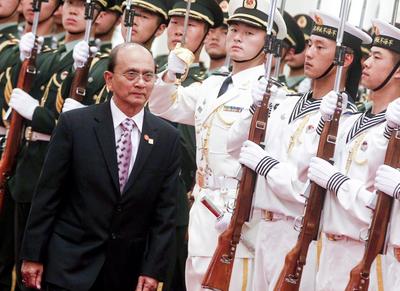The new Parliament has exhibited an unprecedented level of accountability, but given Myanmar’s political climate, the new administration is unlikely to bring about rapid or radical change on the nation’s pressing policy issues. Dissenting opinion is now represented in government, which for years operated on the army’s mentality of unquestioned loyalty. The national budget and government accountability are being discussed — this would have been impossible six months ago. A mixed central cabinet of civilian and military, new and old appointees, alongside regional parliaments and ministers, now form the backbone of the legislative branch of the government. Some analysts have even predicted an eventual split between the Union Solidarity and Development Party (USDP) — which continues to dominate Parliament — and the military over clashes of interest.
Regardless, the military junta has left the new administration with budgetary legacies that will inhibit its ability to instigate meaningful or radical change. Before disbanding, the junta allocated 11 per cent of the national budget to social services, education and health combined. Although this is roughly double previous levels, it is still significantly lower than the 30 per cent allocated to the military. The junta also introduced compulsory National Service, which may bolster the social power of the military in the future.
Ethnic reconciliation also remains problematic. Fragile ceasefires between the Army and ethnic minorities are under tremendous strain. The question of internally displaced persons and refugees also remain to be answered. An arduous process of national reconciliation is needed after human rights violations in the name of national unity, and some international lawmakers are pushing for probes into possible crimes against humanity. An official has disclosed that some prisoners would be granted amnesty, although it is unclear if this includes political prisoners. Hydroelectric dams being constructed by Chinese companies are deeply resented by the local ethnic Kachins who fear flooding of land sacred to them. Although President Thein Sein has stressed the need for cooperation with the ethnic minorities, a long-term modus vivendi remains to be worked out with the various ethnic groups, most of which had engaged in armed rebellion against successive governments.
Thein Sein himself is as yet untested. To some, he is an incorruptible, high-calibre candidate. To others, he is indecisive, and incapable of ending the enduring influence of Senior General Than Shwe. Thein Shein hails from the Army, and is an ardent Than Shwe loyalist. He has made a number of carefully-worded speeches calling for open government, reform and national reconciliation, although little concrete progress on such goals have been made in the first month of his presidency.
Overall, a cautious optimism exists domestically that Myanmar is slowly carrying out much-needed reforms. A symbolic act is the appointment of Sai Mauk Kham, an ethnic Shan doctor, albeit from the USDP, as the Second Vice President. The media remains heavily regulated but the government has announced the relaxing of censorship of apolitical journals. In a rare move, U Myint — a close friend of opposition icon Aung San Suu Kyi, and a former United Nations official — has been appointed chief economic adviser.
In the international arena, much remains to be seen. The upcoming ASEAN summit in Indonesia will be a crucial barometer of regional perceptions of the new administration. It will also be a test of ASEAN’s resolve to see Myanmar undergo genuine transition. Myanmar’s aspirations for the ASEAN chairmanship could be put to good use as ASEAN’s bargaining chip for reform in Myanmar.
Western states have sent mixed signals concerning Myanmar’s new administration. The EU has been flexible, while the US and the UK have maintained their ongoing orientations. The US, represented in Myanmar by new special representative Derek Mitchell, has stated that it will be unwilling to work with ASEAN should Myanmar assume chairmanship in 2014. In its bilateral relations, the US continues to rely on megaphone diplomacy, allowing dissidents and lobbyists significant impact in the context of the relationship. The EU has eased travel restrictions on civilian cabinet members and lifted a ban on high-level visits by EU officials to Myanmar although other sanctions have been extended. Uncertainties continue about Myanmar’s alleged nuclear ambitions and shady connections with North Korea.
It is still too early to decide if Myanmar’s new parliament is a puppet show or an honest step toward the eventual devolution of power. Many of the changes to date have been symbolic, and recent Myanmar history is replete with false dawns. Dissident groups are largely unconvinced. The direction, depth and pace of reform rest on how much President Thein Sein’s administration is truly inclined to embrace change, and, equally importantly, how much change the Army will be prepared to tolerate.
Kyaw San Wai is a Research Analyst with the External Programmes at the S. Rajaratnam School of International Studies (RSIS), Nanyang Technological University. An earlier version of this essay was published here, as RSIS Commentary 73/2011.


There so many things that Myanmar’s new government has to tackle but it needs to pay attention to the most important matters pressing the country. If there is unity among the leaders then anything and everything can be done. Hopefully, a split will not happen because this would imply discontinuation of decisions, actions and effort.